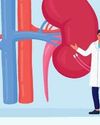Lack of community education and information about type 2 is leading to discrimination, writes Sherl Westlund, a director of Diabetes Research WA

An estimated 1 million Australian adults (that’s 1 in 20 of us) were living with type 2 diabetes in 2014–15. And globally, according to the International Diabetes Federation, it’s estimated 425 million people had diabetes in 2017, and this figure is expected to increase to 693 million by 2040. With the cost of all forms of diabetes in Australia estimated at $14.6 billion each year, it’s clearly in everyone’s best interests to find an effective solution to stopping the soaring rates of type 2 diabetes.
The discrimination that exists against people with type 2 diabetes relates to the belief that it is solely linked to obesity and lifestyle issues brought about by an unhealthy diet and lack of exercise. It’s because of this that many in the community believe the solution is as simple as telling people with diabetes to lose weight and get fit. This approach essentially blames those with the condition for creating their own situation – and leaves them feeling unfairly judged and powerless.
IGNORANCE LEADS TO SHAME GAME
The recently released Amcal 2018 Diabetes Care Review found that more than a quarter (27 per cent) of Australians surveyed believed diabetes to be a self-inflicted disease and 1 in 7 believed diabetes was largely avoidable through simple lifestyle changes. It also found that 1 in 3 of those with diabetes surveyed said feelings of embarrassment and guilt for being made to feel they brought the condition on themselves were key reasons they had not spoken out and sought the emotional support they needed.
This story is from the {{IssueName}} edition of {{MagazineName}}.
Start your 7-day Magzter GOLD free trial to access thousands of curated premium stories, and 9,000+ magazines and newspapers.
Already a subscriber ? Sign In
This story is from the {{IssueName}} edition of {{MagazineName}}.
Start your 7-day Magzter GOLD free trial to access thousands of curated premium stories, and 9,000+ magazines and newspapers.
Already a subscriber? Sign In

A whole new world
Being diagnosed with type 1 diabetes as an adult can be a challenging and confusing time. In this extract from the JDRF's new book, Straight to the Point, they explain what's going on and what to say to people who make uninformed comments about your condition

5 Days 5 Dinners
Weeknights are sorted with these fresh, flavoursome mains, packed with veg!

Fantastic Feta
This soft, white cheese with Greek origins is versatile and packs a flavour punch, with only a small amount needed to jazz up a dish

My story: "I'm proud of the fact that I've gotten hold of my health"
When Natalie Rixon, now 33, discovered she had prediabetes soon after she'd turned 20, it was a shock and a relief all rolled into one. What she did next changed her future.

INTERPRETING YOUR cgm DATA
A continuous glucose monitor is a wonderful source of information but do you really know what you're looking at?

7 NEED-TO-KNOW FACTS ABOUT...diabetes & kidney disease
Diabetes is the most common cause of Chronic Kidney Disease. Learn more about this condition and how to protect yourself from developing it.

GET OFF THE diet ROLLERCOASTER
Dietitian Lyndi Cohen wants you to take a deep breath and think about your weight, and health, in a whole new way.

WHAT IS Wegovy?
Meet Wegovy, the new once-weekly weightloss injection that research shows helps people lose significantly more body weight than those using diet and exercise alone.

MEDICATION & CONSUMABLES
Insulin is available on the Pharmaceutical Benefits Scheme (PBS).

DOLLARS AND DIABETES
When you have type 1 diabetes, it's important to see a variety of health professionals regularly to keep your health on track.